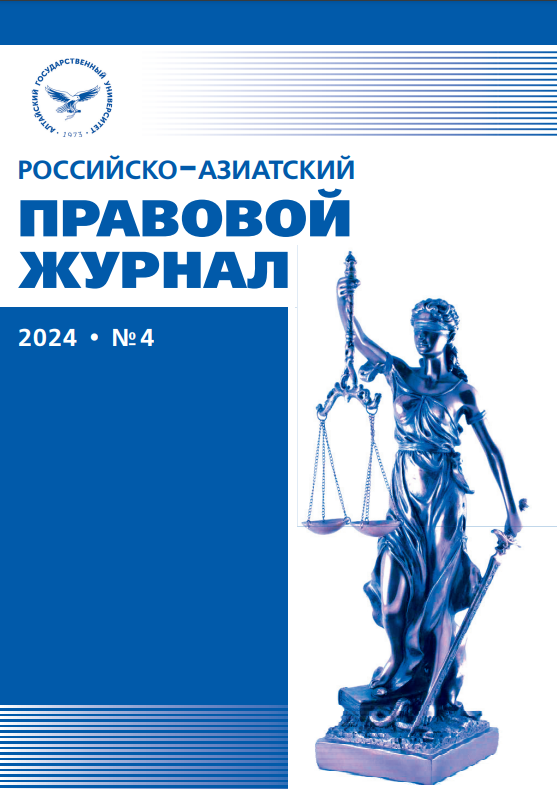INTERNATIONAL ASPECTS OF CONSUMER PROTECTION IN THE EURASIAN LEGAL SPACE
УДК 347.1 ББК 67.404
Abstract
The article deals with the cooperation of Eurasian states in the protection of consumer rights. Developmentof integration processes and cross-border trade required revising approaches to consumer rights protectionand new forms of intergovernmental cooperation in this sphere. This article is a systematic analysis of thecurrent legal regulation of consumer protection issues in the global electronics market. The competence andactivities of the Eurasian Economic Union in consumer protection, the Union's acts on certain problematicaspects of consumer rights, and the experience of interaction between the national authorities of the Union'smember states in this area are examined. The conclusion about the necessity of perfection of legal regulationin the investigated sphere is made considering the specificity of developing regional communications andsaving up international experience. Among the most urgent problems requiring regulation at the level ofthe Eurasian Economic Union identified the regulation of cross-border transactions with the participationof consumers and their protection from unfair terms of contract and unfair business practices, ensuringquality and safety requirements for goods and services in a global market. It is necessary to create neweffective mechanisms for protecting consumer rights in cross-border trade, create a system for resolvingonline disputes involving consumers, transition to complete harmonization of legislation using direct actionregulations, and adopt unified acts at the level of this transnational association.
Downloads
References
Решение Высшего Евразийского экономического Совета от 11 декабря 2020 г. №12 «О Стратегических направлениях развития евразийской интеграции до 2025 года». URL: https://docs.eaeunion.org/docs/ru-ru/01228321/err_12012021_12.
Директива Европейского парламента и Совета Европейского Союза №2011/83/EC от 25 октября 2011 г. О правах потребителей, изменяющая Директиву 93/13/ЕЭС Совета ЕС и Директиву 1999/44/ЕС Европейского парламента и Совета ЕС и отменяющая Директиву 85/577/ЕЭС Совета ЕСи Директиву 97/7/ЕС Европейского парламента и Совета ЕС. URL:https://base.garant.ru/70205196.
Рекомендация Коллегии Евразийской экономической Комиссии от 22 марта 2016 г. №2 «О применении мер, направленных на повышение эффективности взаимодействия уполномоченных органов в сфере защиты прав потребителей государств-членов Евразийского экономического союза». URL:https://docs.eaeunion.org/docs/ru-ru/0159866/clcr_23032016_2.
Рекомендация Коллегии Евразийской экономической Комиссии от 21 ноября 2017 г. №27 «Об общих подходах к проведению государствами-членами Евразийского экономического союза согласованной политики в сфере защиты прав потребителей при реализации товаров (работ, услуг)дистанционным способом». URL: https://docs.eaeunion.org/docs/ru-ru/01517311/clcr_24112017_27.
Рекомендация Коллегии Евразийской экономической Комиссии от 21 мая 2019 г. №15 «Об общих подходах к установлению особых мер защиты прав и интересов отдельных категорий потребителей». URL: https://docs.eaeunion.org/docs/ru-ru/01521897/clcr_24052019_15.
Рекомендация Коллегии Евразийской экономической Комиссии от 15 сентября 2020 г. №14 «Об осуществлении информационного взаимодействия между уполномоченными органами государств-членов Евразийского экономического союза и Евразийской экономической Комиссией по некоторым вопросам защиты прав потребителей». URL: https://docs.eaeunion.org/docs/ru-ru/01427318/err_18092020_14.
Рекомендация Коллегии Евразийской экономической Комиссии от 12 января 2021 г. №1 «О принципах и критериях добросовестной деловой практики в отношении потребителей в сфере розничной торговли товарами». URL: https://eec.eaeunion.org/uploadПринципы%20и%20критерии%20добросовестной%20практики.pdf
Рекомендация Коллегии Евразийской экономической комиссии №25 от 14 июня 2022 г. «О добросовестной деловой практике в отношении потребителей». URL: https://docs.eaeunion.org/docs/ru-ru/01433994/err_16062022_25.
Рекомендация Коллегии Евразийской экономической комиссии от 11 мая 2023 г. N 10 «Об общих подходах к защите прав потребителей в электронной торговле». URL: https://eec.eaeunion.org/upload/files/depsanmer/zpp_e-commerce.pdf.
Регламент Европейского парламента и Совета Европейского Союза 524/2013 от 21.05.2013 об онлайн-рассмотрении споров потребителей и об изменении Регламента (EC) 2006/2004 и Директивы 2009/22/EC (Регламент об ODR потребителей). URL: https://base.garant.ru/70500878.
Директива Европейского парламента и Совета Европейского Союза 2013/11/ЕС от 21.05.2013 об альтернативном рассмотрении споров потребителей и об изменении Регламента (EC) 2006/2004 и Директивы 2009/22/EC (Директива об ADR потребителей). URL: https://base.garant.ru/70500562/
Copyright (c) 2024 И.В. Кирюшина, Т.А. Филиппова

This work is licensed under a Creative Commons Attribution 4.0 International License.
Russian-Asian Law Journal is a golden publisher, as we allow self-archiving, but most importantly we are fully transparent about your rights.
Authors may present and discuss their findings ahead of publication: at scientific conferences, on preprint servers, in public databases, and in blogs, wikis, tweets, and other informal communication channels.
Russian-Asian Law Journal allows authors to deposit manuscripts (currently under review or those for intended submission) in non-commercial, pre-print servers such as ArXiv.
Authors who publish with this journal agree to the following terms:
- Authors retain copyright and grant the journal right of first publication with the work simultaneously licensed under a Creative Commons Attribution License that allows others to share the work with an acknowledgement of the work's authorship and initial publication in this journal.
- Authors are able to enter into separate, additional contractual arrangements for the non-exclusive distribution of the journal's published version of the work (e.g., post it to an institutional repository or publish it in a book), with an acknowledgement of its initial publication in this journal.
- Authors are permitted and encouraged to post their work online (e.g., in institutional repositories or on their website) prior to and during the submission process, as it can lead to productive exchanges, as well as earlier and greater citation of published work (See The Effect of Open Access).








